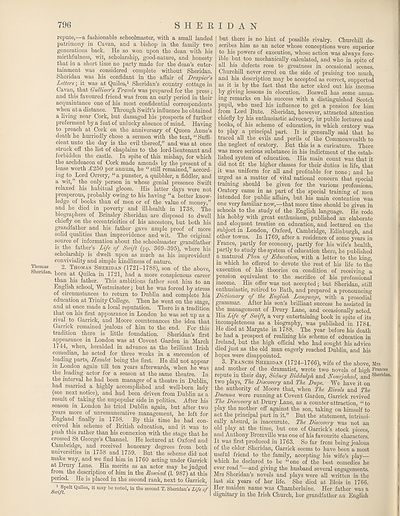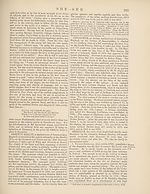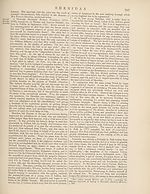Encyclopaedia Britannica > Volume 21, ROT-Siam
(806) Page 796
Download files
Complete book:
Individual page:
Thumbnail gallery: Grid view | List view

796
SHERIDAN
repute,—a fashionable schoolmaster, with a small landed
patrimony in Cavan, and a bishop in the family two
generations back. He so won upon the dean with his
mirthfulness, wit, scholarship, good-nature, and honesty
that in a short time no party made for the dean’s enter¬
tainment was considered complete without Sheridan.
Sheridan was his confidant in the affair of Drapier’s
Letters; it was at Quilca-,1 Sheridan’s country cottage in
Cavan, that Gulliver’s Travels was prepared for the press;
and this favoured friend was from an early period in their
acquaintance one of his most confidential correspondents
Avhen at a distance. Through Swift’s influence he obtained
a living near Cork, but damaged his prospects of further
preferment by a feat of unlucky absence of mind. Having
to preach at Cork on the anniversary of Queen Anne’s
death he hurriedly chose a sermon with the text, “Suffi¬
cient unto the day is the evil thereof,” and was at once
struck off the list of chaplains to the lord-lieutenant and
forbidden the castle. In spite of this mishap, for which
the archdeacon of Cork made amends by the present of a
lease worth <£250 per annum, he “still remained,” accord¬
ing to^Lord Orrery, “a punster, a quibbler, a fiddler, and
a wit,” the only person in whose genial presence Swift
relaxed his habitual gloom. His latter days were not
prosperous, probably owing to his having “a better know¬
ledge of books than of men or of the value of money,”
and he died in poverty and ill-health in 1738. The
biographers of Brinsley Sheridan are disposed to dwell
chiefly on the eccentricities of his ancestors, but both his
grandfather and his father gave ample proof of more
solid qualities than improvidence and wit. The original
source of information about the schoolmaster grandfather
is the father’s Life of Swift (pp. 369—395), where his
scholarship is dwelt upon as much as his improvident
conviviality and simple kindliness of nature.
2. Thomas Sheridan (1721-1788), son of the above,
reman. ]j0ra Quilca in 1721, had a more conspicuous career
than his father. This ambitious father sent him to an
English school, Westminster; but he was forced by stress
of circumstances _ to return to Dublin and complete his
education at Trinity College. Then he went on the stage,
and at once made a local reputation. There is a tradition
that on his first appearance in London he was set up as a
rival to Garrick, and Moore countenances the idea that
Garrick remained jealous of him to the end. For this
tradition there is little foundation. Sheridan’s first
appearance in London was at Covent Garden in March
1744, when, heralded in advance as the brilliant Irish
comedian, he acted for three weeks in a succession of
leading parts, Hamlet being the first. He did not appear
in London again till ten years afterwards, when he was
the leading actor for a season at the same theatre. In
the interval he had been manager of a theatre in Dublin,
had married a highly accomplished and well-born lady
(see next notice), and had been driven from Dublin as a
result of taking the unpopular side in politics. After his
season in London he tried Dublin again, but after two
years more of unremunerative management, he left for
England finally in 1758. By this time he had con¬
ceived his scheme of British education, and it was to
push this rather than his connexion with the stage that he
crossed St George’s Channel. He lectured at Oxford and
Cambridge, and received honorary degrees from both
universities in D 58 and 1759. But the scheme did not
make way, and we find him in 1760 acting under Garrick
at Drury Lane. His merits as an actor may be judged
from the description of him in the Rosciad (1. 987) at this
period. He is placed in the second rank, next to Garrick,
1 Spelt Quilea, it may be noted, in the second T. Sheridan’s Life of
but there is no hint of possible rivalry. Churchill de¬
scribes him as an actor whose conceptions were superior
to his powers of execution, whose action was always forc¬
ible but too mechanically calculated, and who in spite of
all his defects rose to greatness in occasional scenes.
Churchill never erred on the side of praising too much,
and his description may be accepted as correct, supported
as it is by the fact that the actor eked out his income
by giving lessons in elocution. Boswell has some amus¬
ing remarks on his success with a distinguished Scotch
pupil, who used his influence to get a pension for him
from Lord Bute. Sheridan, however, attracted attention
chiefly by his enthusiastic advocacy, in public lectures and
books, of his scheme of education, in which oratory was
to play a principal part. It is generally said that he
traced all the evils and perils of the Commonwealth to
the neglect of oratory. But this is a caricature. There
was more serious substance in his indictment of the estab¬
lished system of education. His main count was that it
did not fit the higher classes for their duties in life, that
it was uniform for all and profitable for none; and he
urged as a matter of vital national concern that special
training should be given for the various professions.
Oratory came in as part of the special training of men
intended for public affairs, but his main contention was
one very familiar now,—that more time should be given in
schools to the study of the English language. He rode
his hobby with great enthusiasm, published an elaborate
and eloquent treatise on education, and lectured on the
subject in London, Oxford, Cambridge, Edinburgh, and
other towns. In 1769, after a residence of some years in
France, partly for economy, partly for his wife’s health,
partly to study the system of education there, he published
a matured Plan of Education, with a letter to the king,
in which he offered to devote the rest of his life to the
execution of his theories on condition of receiving a
pension equivalent to the sacrifice of his professional
income. His offer was not accepted; but Sheridan, still
enthusiastic, retired to Bath, and prepared a pronouncing
Dictionary of the English Language, with a prosodial
grammar. After his son’s brilliant success he assisted in
the management of Drury Lane, and occasionally acted.
His Life of Swift, a very entertaining book in spite of its
incompleteness as a biography, was published in 1784.
He died at Margate in 1788. The year before his death
he had a prospect of realizing his scheme of education in
Ireland, but the high official who had sought his advice
died just as the old man eagerly reached Dublin, and his
hopes were disappointed.
3. Frances Sheridan (1724-1766), wife of the above, Mrs
and mother of the dramatist, wrote two novels of high Frances
repute in their day, Sidney Biddulph and Nourjahad, and Sheridau'
two plays, The Discovery and The Dupe. We have it on
the authority of Moore that, when The Rivals and The
Duenna, were running at Covent Garden, Garrick revived
The Discovery at Drury Lane, as a counter-attraction, “ to
play the mother off against the son, taking on himself to
act the principal part in it.” But the statement, intrinsi¬
cally absurd, is inaccurate. The Discovery was not an
old play at the time, but one of Garrick’s stock pieces,
and Anthony Bromville was one of his favourite characters.
It was first produced in 1 < 63. So far from being jealous
of the elder Sheridan, Garrick seems to have been a most
useful friend to the family, accepting his wife’s play—
which he declared to be “one of the best comedies he
ever read ” and giving the husband several engagements.
Mrs Sheridan’s novels and plays were all written in the
last six years of her life. She died at Blois in 1766.
Her maiden name was Chamberlaine. Her father was a
dignitary in the Irish Church, her grandfather an English
SHERIDAN
repute,—a fashionable schoolmaster, with a small landed
patrimony in Cavan, and a bishop in the family two
generations back. He so won upon the dean with his
mirthfulness, wit, scholarship, good-nature, and honesty
that in a short time no party made for the dean’s enter¬
tainment was considered complete without Sheridan.
Sheridan was his confidant in the affair of Drapier’s
Letters; it was at Quilca-,1 Sheridan’s country cottage in
Cavan, that Gulliver’s Travels was prepared for the press;
and this favoured friend was from an early period in their
acquaintance one of his most confidential correspondents
Avhen at a distance. Through Swift’s influence he obtained
a living near Cork, but damaged his prospects of further
preferment by a feat of unlucky absence of mind. Having
to preach at Cork on the anniversary of Queen Anne’s
death he hurriedly chose a sermon with the text, “Suffi¬
cient unto the day is the evil thereof,” and was at once
struck off the list of chaplains to the lord-lieutenant and
forbidden the castle. In spite of this mishap, for which
the archdeacon of Cork made amends by the present of a
lease worth <£250 per annum, he “still remained,” accord¬
ing to^Lord Orrery, “a punster, a quibbler, a fiddler, and
a wit,” the only person in whose genial presence Swift
relaxed his habitual gloom. His latter days were not
prosperous, probably owing to his having “a better know¬
ledge of books than of men or of the value of money,”
and he died in poverty and ill-health in 1738. The
biographers of Brinsley Sheridan are disposed to dwell
chiefly on the eccentricities of his ancestors, but both his
grandfather and his father gave ample proof of more
solid qualities than improvidence and wit. The original
source of information about the schoolmaster grandfather
is the father’s Life of Swift (pp. 369—395), where his
scholarship is dwelt upon as much as his improvident
conviviality and simple kindliness of nature.
2. Thomas Sheridan (1721-1788), son of the above,
reman. ]j0ra Quilca in 1721, had a more conspicuous career
than his father. This ambitious father sent him to an
English school, Westminster; but he was forced by stress
of circumstances _ to return to Dublin and complete his
education at Trinity College. Then he went on the stage,
and at once made a local reputation. There is a tradition
that on his first appearance in London he was set up as a
rival to Garrick, and Moore countenances the idea that
Garrick remained jealous of him to the end. For this
tradition there is little foundation. Sheridan’s first
appearance in London was at Covent Garden in March
1744, when, heralded in advance as the brilliant Irish
comedian, he acted for three weeks in a succession of
leading parts, Hamlet being the first. He did not appear
in London again till ten years afterwards, when he was
the leading actor for a season at the same theatre. In
the interval he had been manager of a theatre in Dublin,
had married a highly accomplished and well-born lady
(see next notice), and had been driven from Dublin as a
result of taking the unpopular side in politics. After his
season in London he tried Dublin again, but after two
years more of unremunerative management, he left for
England finally in 1758. By this time he had con¬
ceived his scheme of British education, and it was to
push this rather than his connexion with the stage that he
crossed St George’s Channel. He lectured at Oxford and
Cambridge, and received honorary degrees from both
universities in D 58 and 1759. But the scheme did not
make way, and we find him in 1760 acting under Garrick
at Drury Lane. His merits as an actor may be judged
from the description of him in the Rosciad (1. 987) at this
period. He is placed in the second rank, next to Garrick,
1 Spelt Quilea, it may be noted, in the second T. Sheridan’s Life of
but there is no hint of possible rivalry. Churchill de¬
scribes him as an actor whose conceptions were superior
to his powers of execution, whose action was always forc¬
ible but too mechanically calculated, and who in spite of
all his defects rose to greatness in occasional scenes.
Churchill never erred on the side of praising too much,
and his description may be accepted as correct, supported
as it is by the fact that the actor eked out his income
by giving lessons in elocution. Boswell has some amus¬
ing remarks on his success with a distinguished Scotch
pupil, who used his influence to get a pension for him
from Lord Bute. Sheridan, however, attracted attention
chiefly by his enthusiastic advocacy, in public lectures and
books, of his scheme of education, in which oratory was
to play a principal part. It is generally said that he
traced all the evils and perils of the Commonwealth to
the neglect of oratory. But this is a caricature. There
was more serious substance in his indictment of the estab¬
lished system of education. His main count was that it
did not fit the higher classes for their duties in life, that
it was uniform for all and profitable for none; and he
urged as a matter of vital national concern that special
training should be given for the various professions.
Oratory came in as part of the special training of men
intended for public affairs, but his main contention was
one very familiar now,—that more time should be given in
schools to the study of the English language. He rode
his hobby with great enthusiasm, published an elaborate
and eloquent treatise on education, and lectured on the
subject in London, Oxford, Cambridge, Edinburgh, and
other towns. In 1769, after a residence of some years in
France, partly for economy, partly for his wife’s health,
partly to study the system of education there, he published
a matured Plan of Education, with a letter to the king,
in which he offered to devote the rest of his life to the
execution of his theories on condition of receiving a
pension equivalent to the sacrifice of his professional
income. His offer was not accepted; but Sheridan, still
enthusiastic, retired to Bath, and prepared a pronouncing
Dictionary of the English Language, with a prosodial
grammar. After his son’s brilliant success he assisted in
the management of Drury Lane, and occasionally acted.
His Life of Swift, a very entertaining book in spite of its
incompleteness as a biography, was published in 1784.
He died at Margate in 1788. The year before his death
he had a prospect of realizing his scheme of education in
Ireland, but the high official who had sought his advice
died just as the old man eagerly reached Dublin, and his
hopes were disappointed.
3. Frances Sheridan (1724-1766), wife of the above, Mrs
and mother of the dramatist, wrote two novels of high Frances
repute in their day, Sidney Biddulph and Nourjahad, and Sheridau'
two plays, The Discovery and The Dupe. We have it on
the authority of Moore that, when The Rivals and The
Duenna, were running at Covent Garden, Garrick revived
The Discovery at Drury Lane, as a counter-attraction, “ to
play the mother off against the son, taking on himself to
act the principal part in it.” But the statement, intrinsi¬
cally absurd, is inaccurate. The Discovery was not an
old play at the time, but one of Garrick’s stock pieces,
and Anthony Bromville was one of his favourite characters.
It was first produced in 1 < 63. So far from being jealous
of the elder Sheridan, Garrick seems to have been a most
useful friend to the family, accepting his wife’s play—
which he declared to be “one of the best comedies he
ever read ” and giving the husband several engagements.
Mrs Sheridan’s novels and plays were all written in the
last six years of her life. She died at Blois in 1766.
Her maiden name was Chamberlaine. Her father was a
dignitary in the Irish Church, her grandfather an English
Set display mode to:
![]() Universal Viewer |
Universal Viewer | ![]() Mirador |
Large image | Transcription
Mirador |
Large image | Transcription
Images and transcriptions on this page, including medium image downloads, may be used under the Creative Commons Attribution 4.0 International Licence unless otherwise stated. ![]()
| Encyclopaedia Britannica > Encyclopaedia Britannica > Volume 21, ROT-Siam > (806) Page 796 |
|---|
| Permanent URL | https://digital.nls.uk/193637757 |
|---|
| Attribution and copyright: |
|
|---|---|
| Shelfmark | EB.17 |
|---|---|
| Description | Ten editions of 'Encyclopaedia Britannica', issued from 1768-1903, in 231 volumes. Originally issued in 100 weekly parts (3 volumes) between 1768 and 1771 by publishers: Colin Macfarquhar and Andrew Bell (Edinburgh); editor: William Smellie: engraver: Andrew Bell. Expanded editions in the 19th century featured more volumes and contributions from leading experts in their fields. Managed and published in Edinburgh up to the 9th edition (25 volumes, from 1875-1889); the 10th edition (1902-1903) re-issued the 9th edition, with 11 supplementary volumes. |
|---|---|
| Additional NLS resources: |
|

